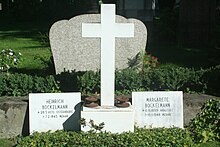Heinrich Bockelmann
Christian Carl Heinrich Bockelmann (born May 28, 1870 in Osternburg ; † February 7, 1945 in Meran ) was a German banker and diplomat.
biography
Bockelmann was born as the son of the captain Johann Hinrich Bockelmann (including the passenger ship Henriette ). In 1892 he emigrated to the Russian metropolis of Moscow , where he went from volunteer to co-owner of the Junker Bank . Bockelmann lived on Kasakowa Street in Moscow and married Anna Luise Förster, a daughter of the co-owner. After the German Empire declared war on Russia, Bockelmann was deported as a German to the Urals / Siberia in 1914 , from where he fled during an approved trip to Moscow to Sweden , where his family had emigrated . From 1915 onwards, Bockelmann from Stockholm passed on findings from his business contacts with Russia to the Foreign Office in Berlin. Bockelmann reported on the domestic political situation in Russia, for example on miners' strikes in the south, and in some cases he spoke to the State Secretary personally. For conflict communication, Bockelmann was supposed to acquire a Russian publisher through straw men. In 1916 he provided the former secretary of the Russian finance minister Sergei Yulievich Witte , the journalist and businessman Josef Kolyschko , and Prince Bebutow , a former member of the Duma , with financial means. Bockelmann and Hugo Stinnes wanted to become the owners .
Part of the financial resources was probably invested in a newspaper project by Maxim Gorky , the Petersburg newspaper Novaya Schisn (New Life) , which has been published since May 1917 . Bockelmann's prognoses did not always apply: on February 24, 1917, two weeks before the revolution in Julian February, he “did not believe in an imminent major change in Russian internal politics”. He later stated that the uprising was "of no great importance". In Stockholm at the end of March 1917, Bockelmann made contact with Isaac Nachman Steinberg (1888–1957), who later became Minister of Justice under Lenin.
After the end of the war in 1918, he bought Gut Barendorf in Lower Saxony , which his wife lived in after the divorce in 1924 until her death in 1965. Bockelmann lived and worked on Berlin's Mauerstrasse in his private bank until he sold it in 1929. In 1931 he acquired Ottmanach Castle and Estate near Klagenfurt , which he handed over to his son Rudolf to manage.
During the Nazi era , he lived with his second wife, whom he married in Berlin in 1925, in Merano , where he died shortly before the end of the war.
family
Heinrich Bockelmann was the father of five children: Werner Bockelmann , Erwin Bockelmann , Gert Bockelmann († August 18, 1975, head of Gut Barendorf and mayor of Barendorf), Johann (Jonny) Bockelmann (born February 8, 1913 in Moscow; † 20. January 2001 in Frankfurt am Main , lawyer and head of BP Hessen) and Rudolf Bockelmann . The latter was the father of the singer Udo Jürgens (1934–2014) and of John Bockelmann (1931–2006) and Manfred Bockelmann (* 1943), a well-known painter and photographer.
literature
- Udo Jürgens with Michaela Moritz: The man with the bassoon. (autobiographical family saga) Blanvalet, Munich 2006.
- Jurij A. Petrov: The banking house JW Junker & Co. In: Year books for the history of Eastern Europe , Volume 42 (1994), page 202-216. ( Digitized at the Bayerische Staatsbibliothek , last accessed on July 22, 2019)
See also
Web links
- WDR 5 ZeitZeichen from May 28, 2015: 1870 - Heinrich Bockelmann's birthday
- Seductions of violence - Russians and Germans in the First and Second World War
Individual evidence
- ^ History of the Bockelmann family
- ^ Klaus Wiegrefe: Russian Revolution: Agent of Power. In: Spiegel Online . December 10, 2007, accessed June 9, 2018 .
| personal data | |
|---|---|
| SURNAME | Bockelmann, Heinrich |
| ALTERNATIVE NAMES | Bockelmann, Christian Carl Heinrich (full name) |
| BRIEF DESCRIPTION | German banker and diplomat |
| DATE OF BIRTH | May 28, 1870 |
| PLACE OF BIRTH | Easter castle |
| DATE OF DEATH | February 7, 1945 |
| Place of death | Meran |
